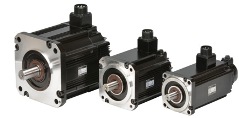Myostat

What is a Servo Motor?
A servo motor is a rotary actuator that is designed for precise precision control. It consists of an electric motor, a feedback device, and a controller. They are able to accommodate complex motion patterns and profiles better than any other type of motor. Although they are small in size they can pack a lot of power, and are extremely energy efficient.
There are two types of servo motors, AC servos and DC servos. The main difference between the two motors is their source of power. AC servo motors rely on an electric outlet, rather than batteries like DC servo motors. While DC servo motor performance is dependent only on voltage, AC servo motors are dependent on both frequency and voltage. Because of the complexity of the power supply, AC servo motors can handle high surges, which is why they are often used in industrial machinery.
Why Choose an AC Servo Motor?
There are several advantages to choosing AC servo motors over DC servo motors. They offer more torque per weight, efficiency, reliability and reduced radio frequency noise. And in the absence of a commutator, they require less maintenance and have a longer life expectancy. AC servo motors are used in a wide variety of applications where position control is critical and are frequently used in robotics, semiconductor equipment, machine tools, and aircrafts.
Check out Myostat’s AC servo motors and fully integrated servo systems or contact us for more information